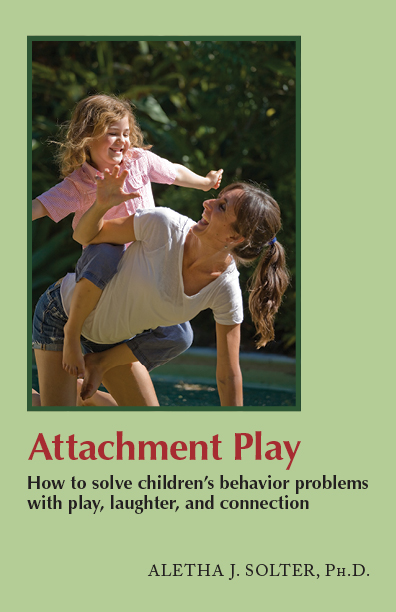Separation anxiety in three-year-old
by Aletha Solter, Ph.D.
Question:
Our son, who recently turned three, has NEVER gone through separation anxiety until now. Not even at the "peak" time of 18 months. Both my husband and I work, and have done so since he was three months old. Lately, though, it's been very hard for him to separate from us. It's heart-wrenching to hear him say, "Promise you'll come back, mom"? and, upon return, "Oh, thank you for coming back, mom"! Sometimes he makes me pinky-swear that I'll come home! He's had the same caregiver since he was three months old. They love each other, and he's very happy with her and the other children. We haven't changed jobs. We're on a pretty routine schedule, so nothing has changed in his life. He moved to a big boy bed months ago with no problem, and he potty trained at age two with no problems. I don't understand why he's just experiencing this now! Can you shed some insight?
Answer:
There are several possible causes for your son's separation anxiety:
1. Developmental awareness of death.
Around the age of three, children develop an awareness of death. They begin to ask questions about death, and they often have new fears at this age. This could explain your son's sudden separation anxiety. He may be afraid that you will die when he is separated from you. This is a terribly frightening thought for anybody, but especially for a young child. If your son asks questions about death, try to answer them simply and truthfully. Reassure him that it's very unusual for someone your age to die and that you plan to live for many, many more years. Some children are reassured to know who would care for them if their parents should die. For others, this is too frightening even to think of. You can be the best judge about this. If you think that your son would benefit from having this information, feel free to share it with him. While your son is going through this stage, I recommend always picking him up promptly when he expects you to. Try not to keep him waiting.
2. Something he has heard or seen.
Even though there is a developmental component that may account for your son's separation anxiety, it could also be triggered by something he has heard or seen, such as a story, TV program, or current event (such as terrorism, war, or a pandemic). Many children's TV programs and videos have frightening parts and are not appropriate for children under the age of seven or eight years. (For example, the films Bambi and The Lion King both portray the death of a parent.) Perhaps he has heard about parents who move out following a divorce or about parents who are deployed overseas. Maybe he has heard of kidnapping or children who have disappeared. Ask him to share with you what specifically he is afraid of and what he has heard, and then correct any misinformation he has. And don't let him watch any frightening movies.
3. Stress or trauma.
You can also try to be aware of any new stress in your family or at his caregiver's. It is normal for children to have increased separation anxiety when their parents feel stressed or are have less time or attention than usual. If something has been preoccupying you (such as health, relationship, or financial problems), this could cause him to feel anxious. Perhaps he is experiencing stress at his daycare. His caregiver might be less attentive than usual, or there might be a difficult social situation with the other children. Maybe he has had a traumatic experience that you are not aware of. For example, perhaps someone has threatened him in some way or touched him inappropriately.
Suggestions for therapeutic play:
There are several therapeutic games you can play with your son to help him overcome separation anxiety by releasing fear through laughter. The game of hide-and-seek is especially effective. Take turns hiding and looking for each other. Be silly and playful. Make it easy for him to find you, and don't stay hidden too long. Another game you can play with your son is a mock chase game in which you make feeble attempts to run away, but let him catch you. You can also let him lock you up in a make-believe cage (made of chairs or cushions), and pretend that you cannot escape until he frees you with a magic key. Playing doctor can also be helpful in helping children work through fears. You can pretend to be sick, and he can pretend to help you get better, perhaps by giving you an imaginary shot or some medicine. Or reverse the roles and let him pretend to be sick. The more your son laughs during these various games, the more he will release his fears.
About Aletha Solter:
Aletha Solter, PhD, is a developmental psychologist, international speaker, consultant, and founder of the Aware Parenting Institute. Her books have been translated into many languages, and she is recognized internationally as an expert on attachment, trauma, and non-punitive discipline.
Aware Parenting is a philosophy of child-rearing that has the potential to change the world. Based on cutting-edge research and insights in child development, Aware Parenting questions most traditional assumptions about raising children, and proposes a new approach that can profoundly shift a parent's relationship with his or her child. Parents who follow this approach raise children who are bright, compassionate, competent, nonviolent, and drug free.


